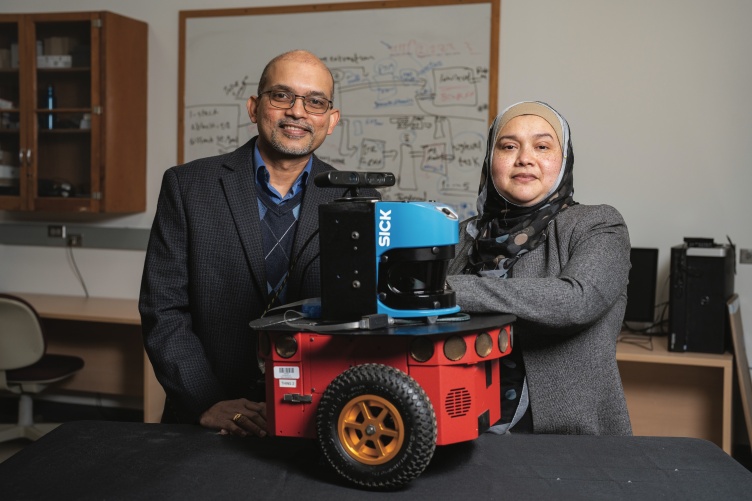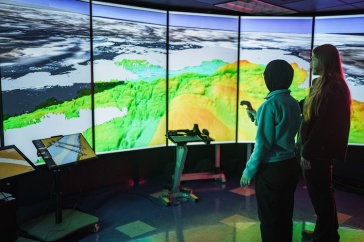
Sajay Arthanat (left), professor of occupational therapy, and assistant professor of computer science Momotaz Begum lead an interdisciplinary team developing a social assistive robot that can help aging adults with dementia remain in their homes.
With a major new grant from the National Institutes of Health, UNH researchers will harness cutting edge technology to help aging adults with dementia remain in their homes.
The five-year grant totaling $2.8 million from the National Institutes of Health’s (NIH) National Institute on Aging supports an interdisciplinary effort to develop and test social assistive robots to aid in the care of individuals with Alzheimer’s disease and related dementia in the comfort of their own homes.
“The ultimate goal of this research is to help support caregivers while keeping their family member healthy and active at home.”
“Caring for aging adults, especially those dealing with progressive Alzheimer’s and dementia, can place a high burden on family caregivers who cannot be with their care recipients 24/7,” says Sajay Arthanat, professor of occupational therapy in the College of Health and Human Services and co-principal investigator on the project. “The ultimate goal of this research is to help support those caregivers while keeping their family member healthy and active at home.”
The interdisciplinary team of researchers, co-led by assistant professor of computer science in the College of Engineering and Physical Sciences, Momotaz Begum, created a prototype robot that has been tested in a controlled lab setting. With the new grant, the research team will build on their success by creating a technological framework to develop social assistive robots with more capabilities and test them in home settings.
This would include compatibility with Internet of Things commercial devices already found in homes, such as motion control cameras and sensors, to keep older adults safe and in line with their health care. For example, if a patient does not take their medication on time, a sensor strategically placed by their pill bottle would track the lack of movement and would alert the assistive robot. The robot would then initiate a vocal reminder to the patient. If, after a few attempts, the patient does not respond by taking their medicine, the robot would alert a remote human caregiver who would be able to intervene.
“With this grant, we will be able to further develop the robot’s technological framework from not only using smart home devices but also artificial intelligence and wearables, like a smart watch, to help gauge the patient’s activity level, health management and connectedness with caregivers,” says Begum.
“Being able to remotely monitor a person’s physical activity and other vital signs can help family, friends and clinicians more effectively manage the disease and may be used to identify a decline in function and take action before an adverse medical event occurs,” says Dain LaRoche, professor of kinesiology in the College of Health and Human Services and a co-investigator on the team.
While this research is focused on robots to aid with Alzheimer’s and dementia care, researchers hope it may have other future applications and benefit seniors by letting them age safely in their homes.
Additional UNH collaborators on the project are John Wilcox, clinical associate professor of occupational therapy; DongPeng Xu, assistant professor of computer science; Jennifer Rabalais, co-director of the Center for Aging and Community Living; and Esmaeil Bahalkeh, assistant professor of health management and policy.
This project was seed-funded in 2019 by UNH’s Collaborative Research Excellence Initiative.
-
Written By:
Robbin Ray ’82 | UNH Marketing | robbin.ray@unh.edu | 603-862-4864
















































